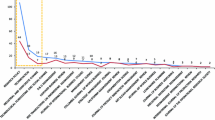Abstract
This study explores the intellectual structure and interdisciplinary breadth of Knowledge Management in its early stage of development. Intellectual structure is established by a principal component analysis applied to an author co-citation frequency matrix. The author co-citation frequencies were derived from the 1994-1998 academic literature and captured by the single search phrase of “Knowledge Management.” Four factors were labeled Knowledge Management, Organizational Learning, Knowledge-based Theories, and The Role of Tacit Knowledge in Organizations. The interdisciplinary breadth surrounding Knowledge Management mainly occurs in the discipline of management. Empirical evidence suggests that the discipline of Computer Science is not a key contributor as originally hypothesized.
Similar content being viewed by others
References
Allen, T. (1970), Roles in technical communication networks. In: C. E. Nelson, D. K. Pollack (Eds), Communication Among Scientists and Scientists and Engineers. Lexington MA: Heath Lexington Books, D.C. Heath and Company, pp. 191–208.
Allen, T. (1977), Managing the Flow of Technology: Technology Transfer and the Dissemination of Technological Information Within the R&D Organization. The Massachusetts Institute of Technology.
Argyris, C., Schon, D. (1978), Organizational Learning: A Theory of Action Approach. Reading: Addison Wesley.
Blacker, F. (1995), Knowledge, knowledge work and organization: An overview and interpretation, Organization Studies, 16 (6): 1021–1048.
Burden, P. (2000), Knowledge Management: The Bibliography, Medford, Information Today.
Culnan, M. (1987), Mapping the intellectual structure of MIS, 1980–1985, MIS Quarterly, 11 (3): 341–353.
Culnan, M. (1986), The intellectual development of management information systems 1972–1982: A co-citation analysis, Management Science, 32 (2): 156–172.
Cohen, W. (1990), Absorptive capacity: A new perspective on learning and innovation, Administrative Science Quarterly, 35: 128–152.
Davenport, T., Prusak, L. (1998), Working Knowledge; How Organizations Manage What They Know, Boston, Harvard Business School Press.
Drucker, P. (1993), The Post-Capitalist Society, New York, Harper.
Grant, R. (1991), The resource-based theory of competitive advantage: Implication for strategy formulation, California Management Review, 33 (3) 114–135.
Grant, R. (1996), Towards a knowledge-based theory of the firm, Strategic Management Journal, 17 (Winter special issue): 109–122.
Hair, J., Anderson, R., Tatham, R., Black, W. (1998), Multivariate Data Analysis, Upper Saddle River, Simon & Schuster.
Hamel, G., Prahalad, C. (1994), Competing for the Future, Boston, Harvard Business Schools Press.
Hedlund, G., Nonaka, I. (1993), Models of knowledge management in the West and Japan, In: Lorange, Chakravarthy, Roos, Van De Ven (Eds), Implementing Strategic Processes: Change, Learning, and Co-operation.
Hedlund, G. (1994), A model of knowledge management and n-form corporation, Strategic Management Journal, 15: 73–90.
Huber, G. (1991), Organization learning: The contributing processes and the literatures, Organization Science, 2 (1): 88–115.
Kogut, B. (1996), What firms do? Organization Science, 7 (5): 502–518.
Leonard-Barton, D. (1995), Wellsprings of Knowledge, Boston, Harvard Business School Press.
Machlup, F. (1962), The Production and Distribution of Knowledge in the US, Princeton, Princeton University Press.
McCain, K. (1990), Mapping authors in intellectual space: A technical overview, Journal of the American Society for Information Science, 41 (6): 433–443.
Mintzberg, H. (1973), The Nature of Managerial Work, New York, Harper & Row.
Nonaka, I., Takeuchi, H. (1995), The Knowledge-Creating Company; How Japanese Companies Create the Dynamics of Innovation, New York, Oxford University Press.
Polanyi, M. (1966), The Tacit Dimension, New York, Doubleday.
Ponelis, S., Fair-Wessels, F. (1998), Knowledge management: A literature overview, South Africa Journal of Library Information Science, 66 (1): 1–10.
Prahalad, C., Hamel, G. (1990), The core competence of the corporation, Harvard Business Review, (May-June): 79–91.
Qunn, J. (1992), Intelligent Enterprise: A Knowledge and Service Based Paradigm For Industry, New York, The Free Press.
Ruggles, R. (1998), The state of the notion: Knowledge management in practice, California Management Review, 40 (3): 80–89.
Senge, P. (1990), The Fifth Discipline: The Art & Practice of the Learning Organization, New York, Doubleday.
Simon, H. (1976), Administrative Behavior, New York, The Free Press.
Stewart, T. (1994), Your company's most valuable asset: Intellectual capital, Fortune, (October, 6).
Stewart, T. (1997), Intellectual Capital; How the Knowledge Economy Is Creating New Challenges for Corporations & New Opportunities for the People Who Work for Them, New York, Doubleday.
Von Hippel, E. (1994), Sticky information and the locus of problem solving: Implications for innovations, Management Science, 40 (4): 429–439.
Weick, K. (1995), Sensemaking in Organizations, Thousand Oaks, Sage.
White, H. (1996), Literature retrieval for interdisciplinary syntheses, Library Trends, 15 (2): 239–264.
Winter, S. (1993), On coase, competence, and the corporation. In: Williamson, Winter (Eds), The Nature of the Form, New York, Oxford University Press.
Author information
Authors and Affiliations
Rights and permissions
About this article
Cite this article
Ponzi, L.J. The intellectual structure and interdisciplinary breadth of Knowledge Management: A bibliometric study of its early stage of development. Scientometrics 55, 259–272 (2002). https://doi.org/10.1023/A:1019619824850
Issue Date:
DOI: https://doi.org/10.1023/A:1019619824850




